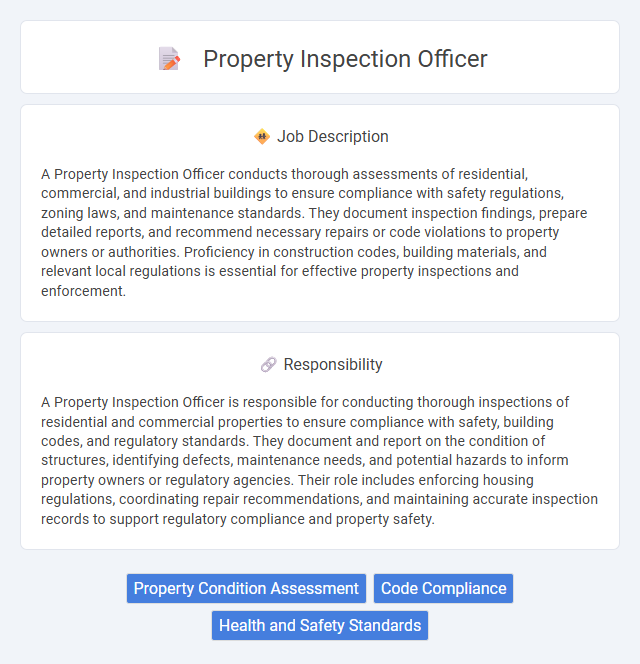
A Property Inspection Officer conducts thorough assessments of residential, commercial, and industrial buildings to ensure compliance with safety regulations, zoning laws, and maintenance standards. They document inspection findings, prepare detailed reports, and recommend necessary repairs or code violations to property owners or authorities. Proficiency in construction codes, building materials, and relevant local regulations is essential for effective property inspections and enforcement.
Individuals with strong attention to detail and good observational skills are likely suitable for a property inspection officer role, as this job requires thorough evaluation of property conditions to identify issues. Those who can remain objective and professional when assessing various property states, including potentially stressful or unsafe environments, may be more successful in this position. Candidates with physical stamina and good communication abilities probably adapt well, as inspections often involve site visits and reporting to clients or management.
Qualification
A Property Inspection Officer typically requires a background in property management, construction, or civil engineering, supported by certifications such as Certified Property Inspector (CPI) or relevant safety training. Strong knowledge of local building codes, regulations, and inspection protocols is essential to ensure compliance and accurate reporting. Proficiency in technical assessment tools and excellent communication skills are crucial for documenting inspection results and interacting with stakeholders effectively.
Responsibility
A Property Inspection Officer is responsible for conducting thorough inspections of residential and commercial properties to ensure compliance with safety, building codes, and regulatory standards. They document and report on the condition of structures, identifying defects, maintenance needs, and potential hazards to inform property owners or regulatory agencies. Their role includes enforcing housing regulations, coordinating repair recommendations, and maintaining accurate inspection records to support regulatory compliance and property safety.
Benefit
A Property Inspection Officer probably enhances property value by identifying maintenance needs and ensuring compliance with safety regulations. The role likely reduces costly repairs and legal issues by detecting problems early, contributing to smoother property management. This position may offer job security and opportunities for professional growth within the real estate and construction industries.
Challenge
A property inspection officer likely faces challenges related to accurately assessing the condition of diverse properties under time constraints. They may encounter difficulties interpreting complex building codes and spotting hidden defects that affect property value and safety. The probability of managing conflicting stakeholder interests and ensuring compliance with regulations adds further complexity to the role.
Career Advancement
Property inspection officers play a crucial role in assessing and ensuring compliance with building codes and safety regulations, which builds a strong foundation for career advancement within the real estate and construction industries. Gaining certifications such as Certified Property Inspector or advancing with specialized training in environmental assessments and risk management enhances prospects for senior roles, including supervisory and consultancy positions. Developing expertise in regulatory compliance, report analysis, and stakeholder communication accelerates progression to managerial roles or specialized inspection consulting careers.
Key Terms
Property Condition Assessment
A Property Inspection Officer specializing in Property Condition Assessment (PCA) evaluates the structural integrity, mechanical systems, and overall functionality of commercial and residential buildings. They identify defects, estimate repair costs, and generate detailed reports crucial for investment decisions and risk management. Proficiency in building codes, construction materials, and environmental regulations ensures thorough and accurate assessments.
Code Compliance
A Property Inspection Officer specializing in Code Compliance ensures that residential and commercial buildings adhere to local, state, and federal regulations, including safety, zoning, and environmental codes. They conduct thorough site inspections, document violations, and collaborate with property owners to enforce corrective actions that maintain community standards and public safety. Proficiency in interpreting building codes and familiarity with municipal ordinances are essential for effective compliance monitoring and enforcement.
Health and Safety Standards
A Property Inspection Officer ensures compliance with health and safety standards by conducting thorough evaluations of residential and commercial buildings to identify hazards such as structural deficiencies, fire risks, and environmental concerns. Their role includes enforcing regulations outlined by local government agencies and occupational health authorities to protect occupants and workers. Detailed inspection reports and timely communication with property owners contribute to maintaining safe, habitable environments and minimizing liability risks.
 kuljobs.com
kuljobs.com